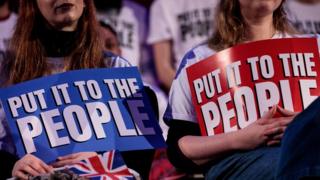 Image copyright
Image copyright
Getty Images
Labour’s governing body is meeting to discuss whether to call for a second public vote on Brexit as part of its European election manifesto.
The National Executive Committee is split between holding a referendum on any deal, holding one with caveats, or rejecting the idea altogether.
The party is also holding further talks with ministers to try to a break the deadlock in Parliament over Brexit.
The EU has set a new deadline of 31 October for the UK’s departure.
But Theresa May has said the UK could leave earlier – and avoid European elections – if MPs can agree a deal before 23 May.
Labour’s National Executive Committee (NEC) oversees the overall direction of the party and is made up of representatives including shadow cabinet members, MPs, councillors and trade unions.
- Labour to redraft Euro election leaflets
- What’s the mood on the doorstep?
- How many Labour supporters voted Leave?
Labour agreed a policy at its last conference that if Parliament voted down the government’s withdrawal deal with the EU – which it has effectively done three times – or talks ended in no-deal, there should be a general election.
But if it could not force one, conference agreed that the party “must support all options remaining on the table, including campaigning for a public vote”.
Since then, though, Labour has entered into cross-party talks with the Conservatives to see if they can reach a consensus on how to get a Brexit deal through Parliament so that Britain can leave.
Many Labour members want the party to make its agreement to any deal conditional on it being put to a public vote – what Labour calls a “confirmatory ballot”.
Labour have not yet made clear what their proposed referendum would be on, but a party briefing paper to MPs published earlier this year said it would need to have “a credible Leave option and Remain” on the ballot paper.
Labour’s divisions over Brexit
Labour’s deputy leader Tom Watson is campaigning for a vote on any deal – including one that Jeremy Corbyn might negotiate.
An ally of the party leader on the NEC , Claudia Webbe, has denounced Tom Watson as “divisive”.
But, in truth, he is merely highlighting the divisions which are already there.
Some Labour MPs in Leave areas want no mention of a second referendum – a view shared by some of the leader’s shadow cabinet allies.
Others can live with the current formulation of a heavily caveated commitment to a referendum as a last resort.
But the need to fight European elections has led 34 of the party’s candidates to say that this ambiguity is no longer sustainable, and around 100 MPs from across the party agree with them.
They want a clear commitment to a referendum under all circumstances.
Tom Watson, the party’s deputy leader, said “the context has changed” since the 2018 party conference and Labour should now throw its full support behind a second referendum “to heal the divide in the country”.
But shadow international trade secretary Barry Gardiner said it would be a change in Labour’s policy, which is to “try to deliver on what people voted for” in the 2016 referendum.
Meanwhile, 34 of Labour’s 70 candidates for the EU elections have committed themselves to campaigning for a referendum between a Brexit deal and the option to remain in the EU.
After a meeting of the Parliamentary Labour Party on Monday night, MP Neil Coyle – who backs a public vote – said he had lost 500 members in his own constituency over the issue.
He said the NEC should “stand up for members or expect members to leave”, claiming they could join Change UK – the new party made up of from former Labour and Tory MPs – instead, which is campaigning for a People’s Vote.
Labour’s Shami Chakrabarti says a fresh public vote could be “the only means of breaking the deadlock”
The latest talks between the government and Labour on Monday were described as “positive” and “productive” by the PM’s de facto deputy David Lidington.
Labour’s shadow environment secretary Sue Hayman said there had been “really constructive discussion”, with the two parties “getting much more into the nuts and bolts of the detail”, and said that she believed the government was “open to moving forward in our direction”.
But Labour’s shadow attorney general Shami Chakrabarti said it was for Labour frontbenchers involved in the Brexit talks with government to tell the NEC whether there was “any hope now of a sensible, jobs-first Brexit deal” or whether “the only means of breaking the deadlock is a confirmatory vote”.
Labour’s position on Brexit
June 2017 – Labour’s general election manifesto accepts referendum result
28 September 2018 – Labour agrees if a general election cannot be achieved it “must support all options… including campaigning for a public vote”
November 2018 – Shadow chancellor John McDonnell says Labour will “inevitably” back a second referendum if unable to secure general election
16 January 2019 – 71 Labour MPs say they support a public vote
6 February 2019 – Mr Corbyn writes a letter to Mrs May seeking five changes to her Brexit policy with no mention of a “People’s Vote”
25 February 2019 – Labour says it will back a public vote if its proposed Brexit deal is rejected
14 March 2019 – Labour orders its MPs to abstain on an amendment calling for a second referendum
27 March 2019 – The party instructs its MPs to support Margaret Beckett’s amendment which calls for a confirmatory public vote on any Brexit deal
Brexit: Labour to decide whether to back further referendum}

